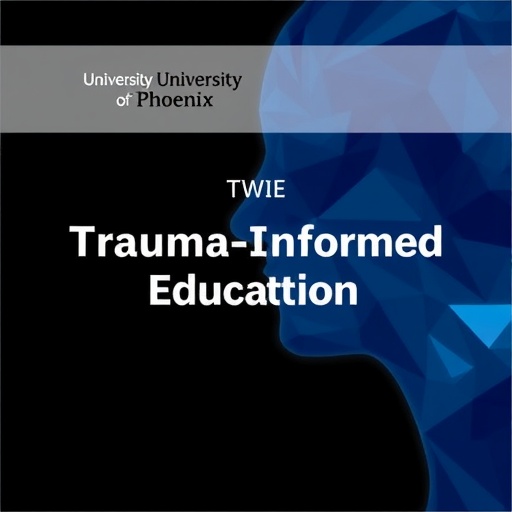The University of Phoenix College of Social and Behavioral Sciences has released a comprehensive white paper titled “Trauma-Informed Education – A Pathway for Relief, Retention, and Renewal.” This substantial contribution to educational research is authored by a team of distinguished scholars and practitioners from the college’s leadership, including Sheila Babendir, Ed.D., LPAC; Barbara Burt, Psy.D.; Michelle Crawford-Morrison, LMFT, LPCC, NCC; Samantha E. Dutton, Ph.D., LCSW-R; Christine Karper, Ph.D., LMHC (QCS); and MaryJo Trombley, Ph.D. The paper presents an in-depth exploration of trauma-informed educational practices and their transformative potential within higher education settings, particularly for adult learners.
Trauma-informed education represents a paradigm shift in pedagogy, acknowledging that learners often engage with academic environments carrying histories of psychological or emotional distress. The authors emphasize that adopting trauma-informed practices is not merely about implementing discrete tactics but embodies a holistic, mindset-oriented approach to education. This educational framework prioritizes creating learning environments characterized by safety, trustworthiness, and emotional support, thereby catalyzing improved academic persistence and psychological well-being for both students and faculty.
Central to the paper is the assertion that working adults, the primary demographic served by many higher education institutions such as University of Phoenix, bring complex and multifaceted life experiences into the classroom. These experiences often include trauma-induced challenges which can interfere with their learning trajectories. The research suggests that when faculty employ trauma-informed strategies—such as fostering psychological safety and facilitating relational trust—they can more effectively engage students, reduce dropout rates, and enhance overall educational outcomes.
The paper delineates the core principles of trauma-informed education, grounding them in contemporary psychological and educational theory. Psychological safety is explained as a condition where students feel confident that they will not be embarrassed or exposed to harm in the learning space. This concept, rooted in studies of group dynamics and cognitive development, is highlighted as foundational to fostering resilience and persistence in academic settings. Faculty training in these principles, therefore, emerges as a critical factor for institutional success.
In addition to benefiting students, trauma-informed teaching practices have significant implications for faculty well-being. The authors discuss how educators exposed to supportive, trauma-aware institutional cultures report decreased burnout, increased job satisfaction, and greater efficacy in their pedagogical roles. This reciprocal dynamic between faculty and students underscores the systemic nature of trauma within educational ecosystems and provides a compelling rationale for institutional investment in trauma-informed approaches.
The white paper further explores the transferability of trauma-informed educational practices beyond the classroom. Specifically, it argues that the knowledge and skills cultivated through these approaches—such as emotional regulation, empathy, and interpersonal communication—are directly applicable to workforce environments. This linkage addresses a critical educational objective: preparing students not only for academic achievement but also for meaningful, sustained engagement in their professional careers.
A notable contribution of the paper lies in its methodological rigor and interdisciplinary synthesis. Drawing on cognitive psychology, social work, educational theory, and clinical practice, the authors present a nuanced framework that bridges theory and practice. By integrating empirical research with pragmatic guidance, the paper serves as a valuable resource for educational institutions aiming to operationalize trauma-informed principles in policy, curriculum design, and faculty development.
The University of Phoenix’s College of Social and Behavioral Sciences exemplifies this approach through its academic programs, which emphasize knowledge acquisition, skills development, character formation, and lifelong learning. These programs are designed to equip students to address a broad spectrum of community needs, including mental health counseling, social work, psychology, human services, criminal justice, and public administration. The trauma-informed lens enriches these disciplines by foregrounding the centrality of trauma in individual and community well-being.
Importantly, the paper contributes to an evolving discourse regarding educational equity and inclusion. Trauma-informed education serves as a mechanism to mitigate systemic barriers and disenfranchisement that disproportionately affect marginalized populations. By fostering environments where diverse student experiences are validated and supported, it advances institutional commitments to social justice and improved educational access.
Furthermore, the white paper underscores the need for institution-wide engagement to sustain trauma-informed educational transformations. This involves leadership buy-in, faculty training programs, curriculum redesign, and the cultivation of partnerships with mental health professionals. Collectively, these strategies help create a resilient educational infrastructure capable of supporting trauma-exposed learners while fostering academic excellence.
In summary, “Trauma-Informed Education – A Pathway for Relief, Retention, and Renewal” offers a timely and essential contribution to contemporary educational practices. It invites educators, administrators, and policymakers to reimagine learning environments that not only acknowledge trauma but actively use trauma-informed frameworks to enhance student success, promote faculty well-being, and prepare learners for dynamic workplace demands. As such, it holds profound implications for the future of adult education in an increasingly complex social landscape.
Readers interested in exploring the full scope of the white paper are encouraged to access the document through the University of Phoenix Media Center. This detailed resource provides further theoretical insights, case studies, and practical recommendations for embedding trauma-informed education across diverse learning contexts.
Subject of Research: Trauma-Informed Educational Practices in Higher Education
Article Title: Trauma-Informed Education – A Pathway for Relief, Retention, and Renewal
News Publication Date: Not specified
Web References: https://www.phoenix.edu/media-center/thought-leadership/perspectives-findings/2025/trauma-informed-education.html
Keywords: Trauma-informed education, adult learners, psychological safety, faculty well-being, retention, higher education, cognitive psychology, social work, lifelong learning, workforce skills




